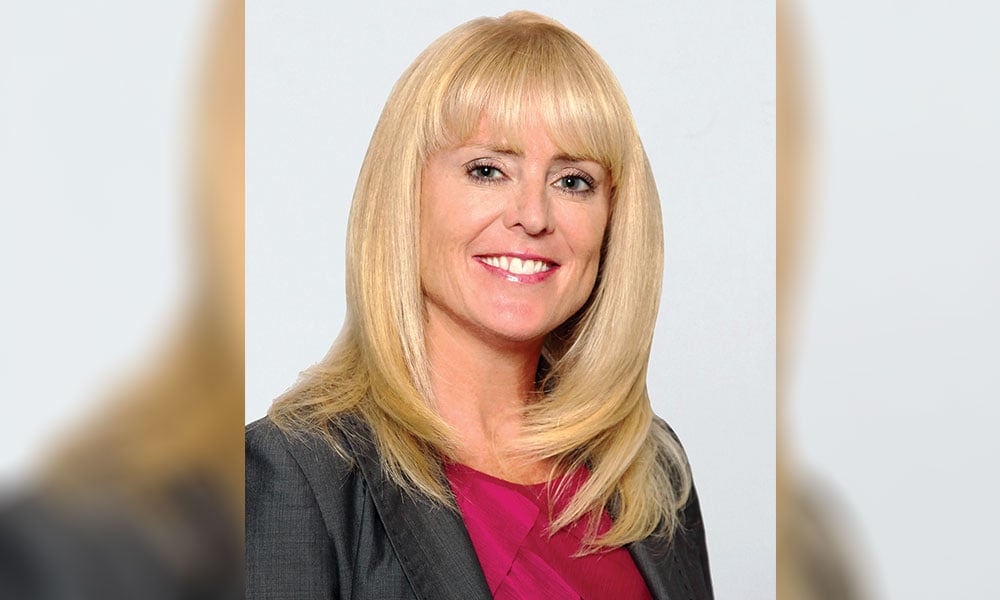After leading her firm for 6 years, Micheline Gravelle recently stepped down as managing partner

While much has been written about the biases, assumptions and stigmas that lie as obstacles on a woman’s path up the career ladder, Bereskin and Parr’s Micheline Gravelle — who recently stepped down from her role as managing partner — says there are also gendered expectations and drawbacks in saying “no” to being boss.
“It was really hard as a woman, I think, to say ‘no’ and decide not to continue,” she says. “Breaking through the glass ceiling is possible, but even more empowering was my decision to step down after being acclaimed for a third term. Being able to say ‘no’ and to do what is best for you is often hard as a woman.
“It was empowering for me to say no to something as I've never done that,” she says.
The firm announced Gravelle’s move in early January, adding that she will continue to lead the firm’s life sciences group. Mississauga, Ont. trademark and patent agent Stephen Beney has taken her place as managing partner.
There is evidence behind Gravelle’s sense of a unique hesitation among women to respond in the negative. A widely publicized study by Baylor School of Medicine’s Katharine O'Brien and Eden King of George Mason University showed that women find it harder than men to decline assignments that are outside the scope of their jobs. And the women who did say “no” faced consequences in performance reviews and were less likely to be promoted.
While Gravelle considered her options, she drew up two lists: reasons to stay and reasons to go. Her entire “why to stay” list consisted of what was best for the firm, while her “why to go” list was what was best for her.
“With females, especially in leadership roles, we just feel we have to do everything and please everybody,” she says. “It could be biological. We feel the need to nurture and care about others, not put our oxygen mask on first.”
She added that, as there are few female managing partners, she was weighed also with a feeling she was letting women down.
“As a human being, that's not a reason to continue, just to be an important stat,” she says. “You have to do what's best for you. I always say you have to leave something in a better place as when you found it, and I felt I accomplished that.”
During Gravelle’s time at the head of the firm, the priorities she pushed included teamwork, wellness, diversity and inclusion. She wanted to avoid people working in silos, worrying about their own billings and neglecting training and mentoring, so she changed the compensation system to reward teamwork by reviewing event attendance, work delegation and mentoring. The firm now polls associates, who review the partners, while remaining anonymous.
“That's information that we take seriously. If an associate says someone’s difficult to work with, it doesn't matter how high your billings are… And that's had a remarkable effect,” she says.
Gravelle adds that the data shows happy people are more productive. The firm holds “Mindful Monday” meditation sessions and has brought in cognitive behaviour specialists for presentations. She instituted a policy that staff members do not work on their birthday and changed the dress code so wearing a suit is no longer required.
“Which is really important, especially for new recruits. The last thing you want to do was go out and spend a fortune on a wardrobe,” she says.
Gravelle says her successor plans on carrying on with the programs and initiatives she has begun.
Having led the life sciences group since she joined Bereskin and Parr in 1996, Gravelle says she looks forward to having more time to devote to the group and her practice. She says her decision to hand over the reins of the firm was true to the spirit of the wellness focus she had spent her time fostering as managing partner.
“I would like to somehow get across to young lawyers and young female lawyers [that], sometimes, you have to do the best for you,” she says. “Don’t always worry about having to follow a specific path and being this particular person. It's important to take time for yourself. I preach all this mental health awareness and wellness and so I've got to start living it.”
Generational shift
When Gravelle had her son 20 years ago, she took only two weeks of maternity leave, later taking just six weeks when her daughter was born. At the time she became a mother, she was also nurturing the firm’s budding life sciences group, which was growing, gaining clients and which Gravelle did not want to put on pause.
“If you spoke to some younger associates, they are getting a bit better at doing what's best for them,” she says. “Now we're seeing female associates go off for a full year and a half or at least a year.”
Career trajectory
Became a qualified patent agent: 1992 (Canada), 1996 (U.S.)
University: B.Sc in Biochemistry at Concordia and M.Sc in immunology at the University of Toronto
Joined Bereskin and Parr: 1996
Leader of life sciences group: 1996 – present
Helped start cannabis group: 2018
Served on executive committee: 2007-2009 and 2013-2019
Managing partner: 2014-2019










